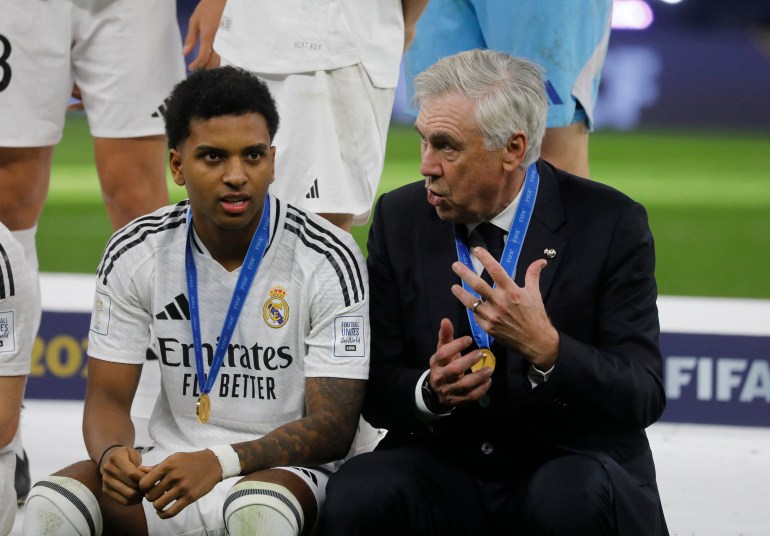Real Madrid won the FIFA Intercontinental Cup after beating Mexico’s Pachuca 3-0 in a largely one-sided final in Qatar, with Kylian Mbappe, Rodrygo and Vinicius Jr all on target.
The Spanish giants did enough to win comfortably on Wednesday and never looked like relinquishing control, although they did allow the CONCACAF champions to threaten counterattacks at times at Lusail Stadium.
The Champions League champions opened the scoring in the 37th minute with a good collective goal, with a pass from Jude Bellingham to Vinicius Jr, who gave it past the goalkeeper before putting it on a platter to Mbappé, who shot into an empty net.
Rodrygo extended his lead with a fine effort in the 52nd minute, when he beat two defenders before returning inside and shooting with his right foot into the most sensitive corner.
Vinicius Junior, who won FIFA’s best player award on Tuesday, got a simple win for Real Madrid from the penalty spot in the 83rd minute, after Oussama Idrissi fouled captain Lucas Vazquez in the box.
Having won three trophies in the original Intercontinental Cup, the predecessor to the existing format that pitted the champions of Europe and South America against each other, and five Club World Cups, Real have won a combined total of nine titles worldwide.
“We are very satisfied to have won another title,” Rodrygo told Spanish television channel Telecinco.
“I’m a little worried about the goal because Jude [Bellingham] is in front of the goalkeeper, but he doesn’t interfere in the game, so I’m pleased to be able to help the team.
“Vinicius is wonderful, there’s a lot at stake at the moment and we’re happy to have him with us. We have a wonderful team and we are delighted.
Pachuca threatened with early moves by Oussama Idrissi, Luis Rodriguez and Elias Montiel denied through goalkeeper Thibaut Courtois, but Real gradually began to take control with Vinicius Jr and Rodrygo directing the chains and Bellingham feeding them with damaging passes into space.
Rodrygo and Bellingham had two clever chances to score before Mbappe gave them the lead and Pachuca was lucky to come into the break to avoid losing by a wider margin as Real pressed.
After Rodrygo curled home Real’s second goal seven minutes into the second half, manager Carlo Ancelotti made several changes.
His team then missed several opportunities before Vázquez appealed for a foul inside the area that the referee had not first detected, but awarded a penalty after checking the VAR replay.
Vinicius shot low on the right and goalkeeper Carlos Moreno had a hand, but it was not enough to prevent him from finding the back of the net.
Real’s triumph also marked a remarkable milestone for their coach, Carlo Ancelotti, as the Italian is the coach with the most titles in the club’s history with a total of 15 trophies.
The victory means that Ancelotti has surpassed the defeated Miguel Muñoz, whom he equalled in August by winning the European Super Cup against Atalanta.
“There are so many titles! I’m delighted, happy. . . it’s a story of good luck,” Ancelotti told Spanish television channel Telecinco with a smile.
“Today, I really liked the attitude from the players. Up front, they made the difference, Vinicius Jr had a great game. Offensively, we did well.
“We have a lot of quality. Kylian [Mbappe] had a good game, Rodrygo scored the second … We are very happy because we won a title far from home and in the middle of a busy season.”
The 65-year-old Ancelotti has one of the most decorated CVs in world football.
When he lured him to Madrid for a second stint three years ago, following the departure of big club Zinedine Zidane, he knew his only task was to build the Real trophy and he did not disappoint.
He became the first manager to win titles in one of Europe’s top five leagues (England, Spain, Germany, Italy and France) and guided Real Madrid to two Champions League and La Liga games in three seasons.
Ancelotti’s silverware at Real Madrid 3 Champions Leagues, two Club World Cups, 3 European Super Cups, two Spanish Leagues, two Spanish Cups, two Spanish Super Cups and, now, an Intercontinental Cup.
— FIFA Club World Cup (@FIFACWC) December 18, 2024

